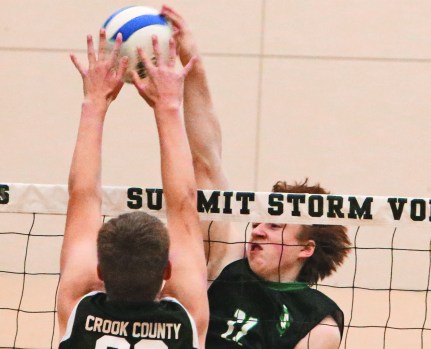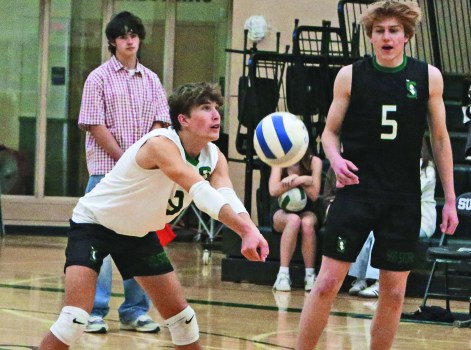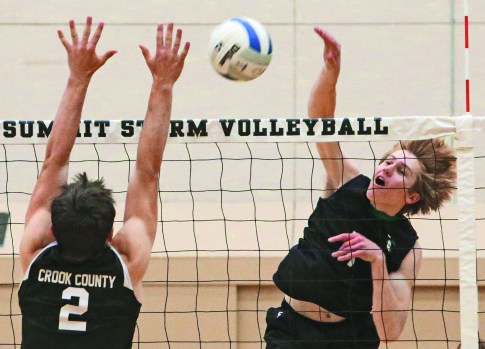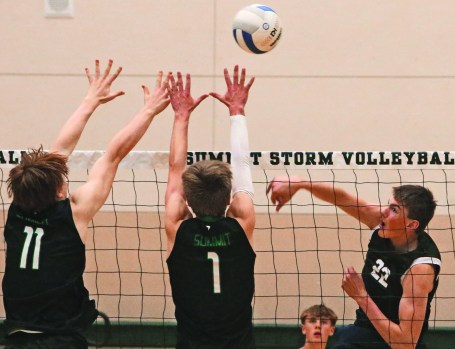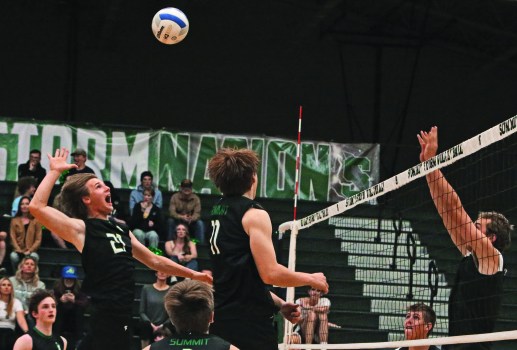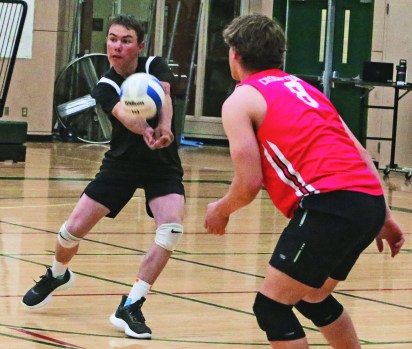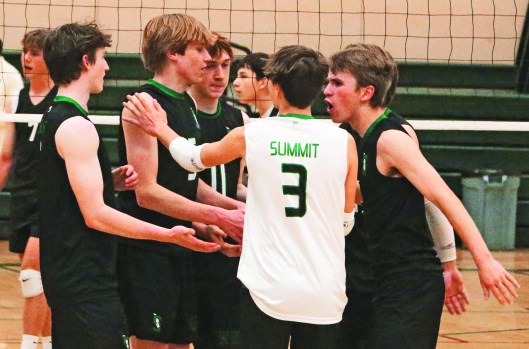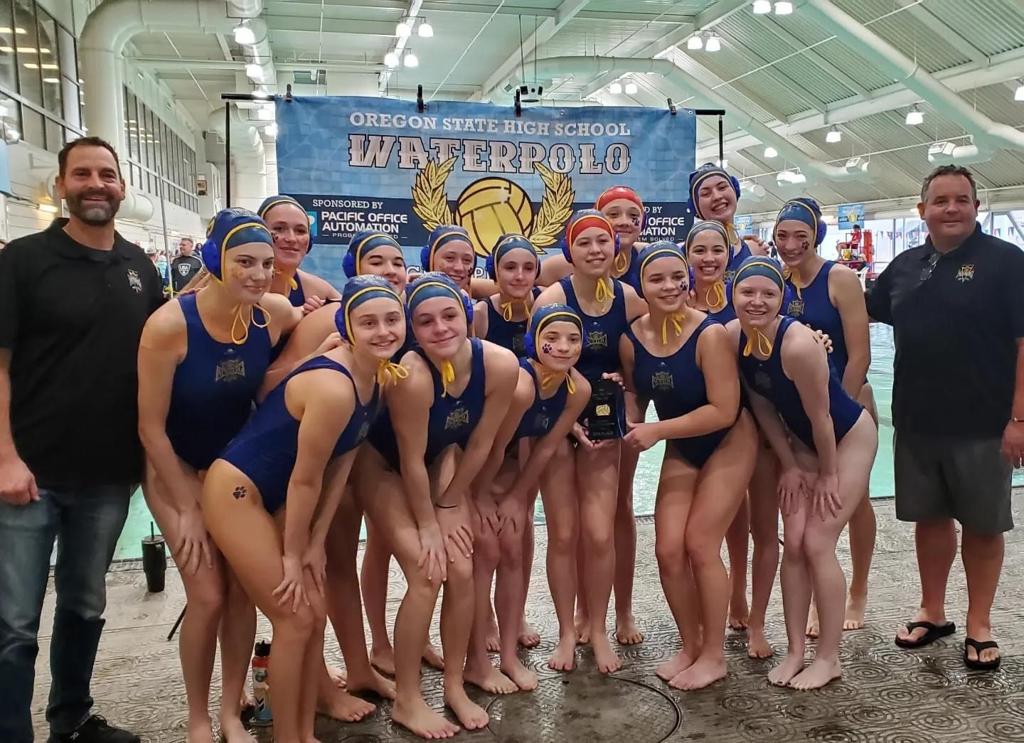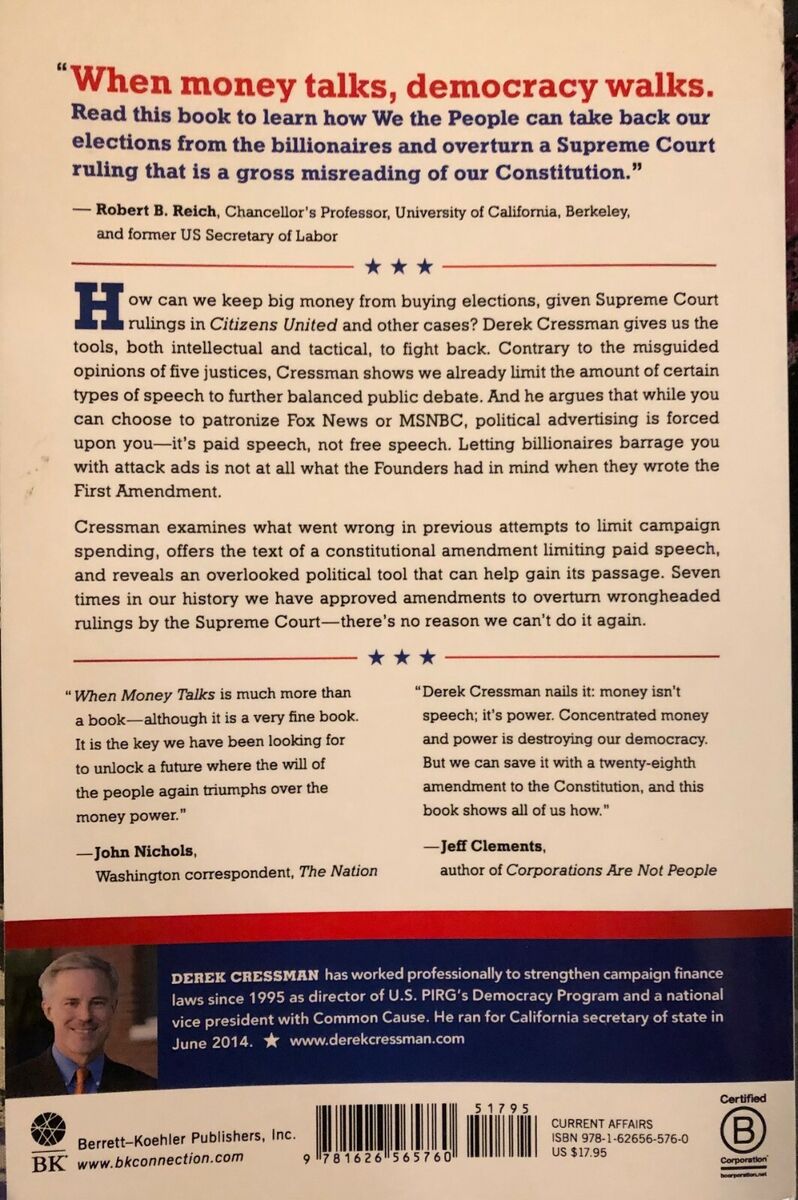Sports
Second year of boys volleyball brings improved play
Second year of boys volleyball brings improved play Published 12:46 pm Wednesday, April 30, 2025 1 of 7 Crook County’s Caleb Decker, left, tries to block a spike from Summit’s Anand Groves, during the Summit-Crook County volleyball match at Summit High in Bend Monday afternoon. 4-28-25 Andy Tullis/The Bulletin Summit’s 3Edward Archer, left, bumps the […]
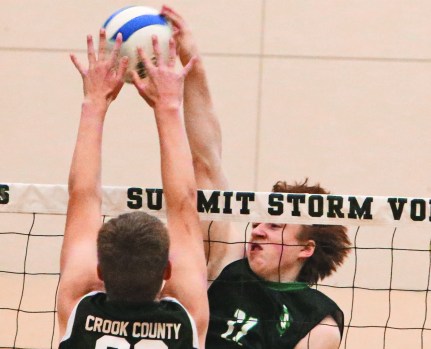
Second year of boys volleyball brings improved play
Published 12:46 pm Wednesday, April 30, 2025
1 of 7
One of the main differences between the first and second year of high school boys volleyball in Oregon is in the eyes of Summit’s Gavin White.
White can’t remember a single set during the high school season a year ago en route to a state title where the matches were competitive. This year, the competition level, he feels, has been raised.
“We haven’t had many close games except for this year,” said White, a junior setter. “I think it is good to see some better teams that are going to put up a fight.”
Monday evening two of the three Central Oregon boys volleyball teams squared off at Summit High. Summit rolled past Crook County in straight sets (25-8, 25-13, 26-24). The Storm have won eight of nine matches this spring, and have won 22 of the possible 26 sets.
But against the Cowboys, despite winning handily in the first two sets, the Storm found themselves in unfamiliar territory in the third set. They were in a major hole and needed to dig their way out to avoid dropping the set.
“They are working on meshing together as a team and keeping that excitement up,” said Crook County coach Mallory Hall of her team. “Because when they do, they play great.”
Crook County built a 13-5 lead midway through the set and had the set tied at 24 before the Storm were ultimately able to pull away. Being on the ropes, even for a set, isn’t something Summit was used to.
“We don’t have a lot of these situations in school volleyball,” said Summit sophomore Aiden Woods. “But we do in club volleyball.”
With boys volleyball being such a new sport at the high school level – the second year of its trial run as an “emerging activity” with the chance to be a fully-sanctioned sport by the Oregon Schools Activities Association next year – there is a high variance of skill level.
But perhaps it is to be expected with so many schools and the majority of the athletes giving the sport a try for the first time. Some teams have a core of players who play volleyball for a club, while others are starting from scratch trying to build and introduce a new sport.
That is the case for Crook County. When the program started a year ago, only one of its players had played volleyball competitively.
“The difference in skill for each player has been amazing,” Hall said. “Just seeing them come back from last year and realized where we started last year and seeing how well they have honed their skills has been really great to see as a coach.”
The Cowboy have put together a quality season, winning five of their eight matches with two of their losses coming to Summit.
There are four games remaining in the regular season and the Cowboys are hoping to get better in time for the eight-team Class 4A culminating event in late May.
“We are just hoping that they can continue to improve,” Hall said. “We don’t want them to plateau. We are going to keep practicing. I’m just hoping that they are able to make the improvements that they are hoping for.”
Sports
Altoona boys volleyball comes up short | News, Sports, Jobs
MECHANICSBURG — Undefeated Cumberland Valley swept Altoona, 25-12, 25-18, 25-17, in high school boys volleyball on Thursday. Lukas Weathersbee had 10 kills, four digs and a block for the Mountain Lions. Caleb Terza had 18 assists, and Nino Yohn finished with 15 digs. SERVICE POINTS ALTOONA: Coldwell 5, Weathersbee 4, Mitchell 2. Records: Altoona (3-10); […]

MECHANICSBURG — Undefeated Cumberland Valley swept Altoona, 25-12, 25-18, 25-17, in high school boys volleyball on Thursday.
Lukas Weathersbee had 10 kills, four digs and a block for the Mountain Lions. Caleb Terza had 18 assists, and Nino Yohn finished with 15 digs.
SERVICE POINTS
ALTOONA: Coldwell 5, Weathersbee 4, Mitchell 2.
Records: Altoona (3-10); Cumberland Valley (14-0).
JV: Cumberland Valley, 25-9, 24-26, 15-7.
CC girls win
EBENSBURG — Central Cambria defeated Penn Cambria, 83-66, in high school girls track and field on Wednesday.
Paige Alexander won both the 800 and 1600 runs for the Lady Devils.
Kate Eckenrode won the 100 dash and the long jump for Penn Cambria.
GIRLS
100 dash: 1. K. Eckenrode PC 12.64; 2. R. Ronan PC 13.35; 3. D. Farabaugh PC 13.36. 200 dash: 1. R. Ronan PC, 27.75; 2. S. Mahalko, PC, 28.04; 3. K. Zernick, CC, 28.54. 400 dash: 1. L. Gergley, PC, 1:03.02 ; 2. C. Gleason CC 1:03.64; 3. Ab. Sheehan, CC, 1:04. 800 run: 1. P. Alexander, CC, 2:44.72; 2. A. Long, CC, 2:44.75; 3. A. Kubat, CC, 2:44.96. 1600 run: 1. P. Alexander, CC, 6:44.87; 2. Al. Sheehan, CC, 6:44.89; 3. M. Brandis CC, 6:45. 3200 run: 1. K. Krumenacker, CC, 14:16.84; 2. Ab. Sheehan CC, 14:16,90; 3. M. Brandis CC, 14:17.25. 100 hurdles: 1. C. Karabinos 17.49 PC; 2. H. Campbell CC 3. M. Pablic, CC 19.22. 300 hurdles: 1. M. Pablic, CC, 53.43; 2. G. Grimaldi, CC, 55.40; 3. H. Campbell, CC, 55.90.
400 relay: 1. Central Cambria (Kim, Venslosky, Zernick, Grimaldi), 54.27. 1600 relay: 1. Central Cambria (Gleason, Al. Sheehan, Hite, Alexander) 4:23.12. 3200 relay: 1. Central Cambria (Alexander, Long, Ab. Sheehan, Al. Sheehan), 11:07. High jump: 1. A. LeMaster ,PC, 5-0; 2. C. Karabinos, PC, 4-8; 3. K. Benko, CC, 4-4. Long jump: 1. K. Eckenrode, PC, 16-6; 2. R. Ronan, PC, 16-3; 3. D. Farabaugh, BC, 15-8. Triple jump: 1. A. Hite PC, 34-6; 2. A. LeMaster PC, 34-3; 3. K. Benko CC, 28-7. Shot put: 1. C. Anderson, CC, 30-10; 2. K. Galovich, PC, 27-2; 3. E. Kasecky, CC, 23-10. Discus: 1. C. Anderson CC, 88-8; 2. K. Galovich, PC, 80-2; 3. L. Wise CC, 70-6. Javelin: 1. A. Shoemaker, PC, 90-7; 2. E. Davison PC, 71-11; 3. L. Wise, CC, 70-5. Pole vault: 1. H. Amigh, CC, 7-0; 2. A. Kabo, CC, 6-0.
Sports
No. 13 Sandy Owls set for NCAA Championship
Story Links GULF SHORES, Ala. – For just the third time in program history, the No. 13 seed Florida Atlantic beach volleyball team will compete in the NCAA Beach Volleyball Championship, taking on No. 4 seed LMU in the opening round on Friday, May 2 at 9 a.m. ET in Gulf Shores, […]
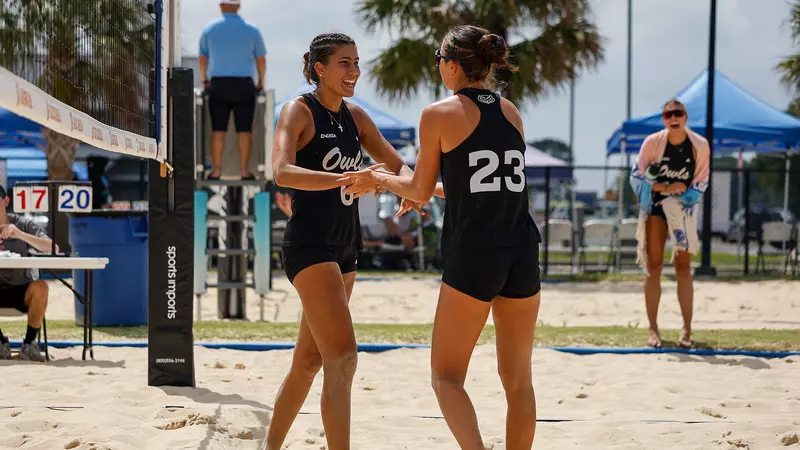
GULF SHORES, Ala. – For just the third time in program history, the No. 13 seed Florida Atlantic beach volleyball team will compete in the NCAA Beach Volleyball Championship, taking on No. 4 seed LMU in the opening round on Friday, May 2 at 9 a.m. ET in Gulf Shores, Alabama. Fans can catch all the action live on ESPN2.
The Sandy Owls won their second Conference USA title last Saturday and their third conference title in program history.
Florida Atlantic will match up against No. 4 LMU to kick things off on Friday. The Sandy Owls will seek their first win over the LMU as the Lions lead the series 4-0. Florida Atlantic last faced LMU on April 5, 2014, at the Florida State Unconquered Invitational, which saw the Sandy Owls fall 4-1.
Entering the NCAA Championships, the Sandy Owls’ No. 1 pair of Ashleigh Adams and Marketa Svozilova are 25-5 on the season, tying the program single-season pair wins record. Adams boasts a team-best 27-6 record, while Svozilova sits just one win behind at 26-5. Florida Atlantic’s pair two, Julie Honzovicova and Kate McLaughlin, enter the tournament at 13-2 with a team-leading 11-match winning streak. The senior duo have both surpassed 20 wins individually this season, each tying for third on the team with a 24-11 record. Florida Atlantic’s court three pair of Klaire VanDeusen and Shayna Wolf are 2-2 as a pair in 2025. The Sandy Owls’ court four pair of Sydney Schroder and Olivia Strandberg are 5-3 on the season, and went 2-0 during the CUSA Championship, both of which were match-clinching wins. Florida Atlantic’s final pair, Kendall Mignerey and Shantel Starling, are 3-2 as a duo this season. Mignerey boasts a team fourth-best 18-16 record, while Starling is 11-12 individually this season.
The Owls’ 2025 postseason is powered by Demand the Limits Injury Attorneys. Visit demandthelimits.com for more information.
Florida Atlantic will open up play in the 2025 NCAA Beach Volleyball Championships on Friday, May 2, as the No. 13 seed Sandy Owls will face off against No. 4 seed LMU for an 9 a.m. ET first serve in Gulf Shores, Alabama.
For updates, follow @FAUBeachVB on X and Instagram, or like FAU Beach Volleyball on Facebook.
Sports
Sales Executive – Volleyball – Capelli Sport
Who We Are: Capelli Sport is a global multi-sports brand based in New York City and New Jersey, specializing in team sports. With a strong club community reaching all corners of the world, we empower and unite people from amateur, to youth and pro clubs. Our goal is to build equal and diverse playing fields […]

Who We Are:
Primary Duties (as outlined below, but not limited to)
- Meeting revenue goals and profitability targets established by sales leadership.
- Networking and prospecting within the assigned territory to develop a robust understanding of the Volleyball landscape (club, institutional & rec), get to know all teams and have them know Capelli Sport.
- Maintaining or acquiring specific data on clubs and/or teams in focused territory to implement into customer retention software (excel and/or Salesforce).
- Sales is a team sport, collaborate with sales managers and executives sharing network and contacts outside of assigned territory.
- Keeping updated with market shifts while being fully aware of new internal product selection as well as competitive landscape.
- Participating in events, organized tournaments, industry conferences, and other Volleyball events that shall involve new business development opportunities, current and non-current partners.
- Directly engage in sales operations and tasks that may impact current or perspective customers, such as profitability analysis, presentation proposal, contract creation and post-sale relationship management.
- Ability to adapt and interested to learn new sport categories thus increasing value and versatility to organization.
Qualifications
- Bachelor’s Degree or higher preferred;
- 5+ years of outside sales experience in Volleyball industry preferred;
- Proficient in MOS (Word, Excel, PowerPoint, Outlook);
- Excellent financial literacy skills required;
- Strong communication and presentation skills;
- Work-flow management skills. Clear understanding of responsibilities, reporting, data driven culture and prioritization skills.
- Strong knowledge of the soccer landscape in North America.
- Ready to work non-traditional hours, with the inclusion of weekends, to meet expected sales targets and client demands.
Capelli Sport LLC. is committed to equal treatment and opportunity in all aspects of recruitment, selection, and employment without regard to gender, race, religion, national origin, ethnicity, disability, gender identity/expression, sexual orientation, age, veteran or military status, or any other category protected under the law. Capelli Sport is an equal opportunity employer; committed to a community of inclusion, and an environment free from discrimination, harassment, and retaliation
Sports
6 Lopes earn AVCA Top Flight honors
Story Links Grand Canyon University’s beach volleyball program continues to gain national recognition as three Lopes pairs earned AVCA Top Flight Awards, as announced Friday by the American Volleyball Coaches Association (AVCA). The Top Flight program, now in its seventh year, honors beach pairs who compete in at least 15 matches […]
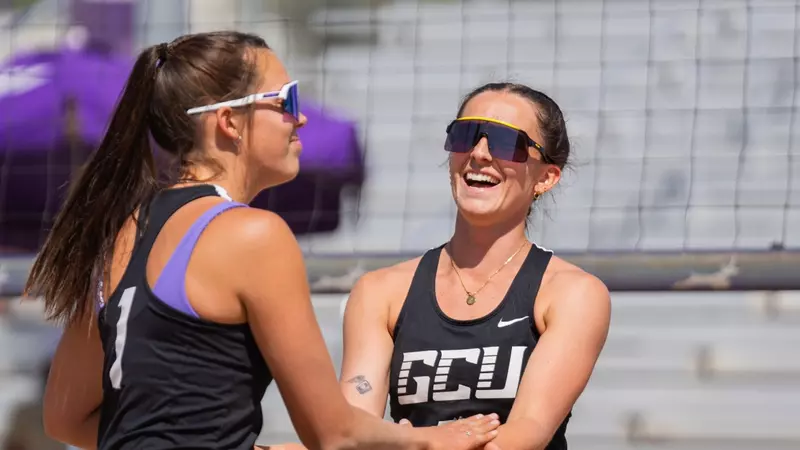
Grand Canyon University’s beach volleyball program continues to gain national recognition as three Lopes pairs earned AVCA Top Flight Awards, as announced Friday by the American Volleyball Coaches Association (AVCA).
The Top Flight program, now in its seventh year, honors beach pairs who compete in at least 15 matches together at a specific flight and win at least 75 percent of those contests. In 2025, 88 pairs from 45 schools across NCAA Divisions I, II, III, NAIA, and Two-Year Colleges were recognized for their elite performances.
GCU’s honorees spanned three different flights:
Flight 3: Jessica Drake (redshirt junior) and Becca Drake (sophomore) compiled a dominant 20–3 record, showcasing consistent synergy throughout the season.
Flight 4: Sophia Hladyniuk (senior) and Karynn Garrow (sophomore) led the way with a 21–6 mark.
Flight 5: Madi Bogle (senior) and Regan Holmer (redshirt junior) finished their season at 20–5.
“We made a huge jump up in the rankings this year and were competitive with virtually every team in the country,” GCU head coach Abra Rummel said. “The success of these three pairs was instrumental in that success. I am very proud of their commitment to GCU beach volleyball, and am so excited for the future of a team returning so much of its very talented starting lineup.”
Grand Canyon Beach Volleyball capped off the 2025 season with a 23–11 overall record, highlighted by eight victories over nationally ranked opponents. The Lopes climbed to a No. 13 national ranking in the most recent AVCA Coaches Poll. The team’s success was fueled by standout individual performances, including two All-Conference selections and six players earning AVCA Top Flight All-American honors across three different flights. The combination of national recognition, elite wins, and postseason accolades underscored a very successful campaign this season.
Sports
Track and Field’s Santos Earns Second NEC Rookie of the Week Honor
Story Links EASTON, Mass. (April 30, 2025) – Freshman Hannah Santos (Swansea, Mass.) of the Stonehill College track and field team was named Northeast Conference Rookie of the Week for the second time this year, the conference announced on Wednesday. Santos and the Skyhawks competed at the University of Massachusetts this […]
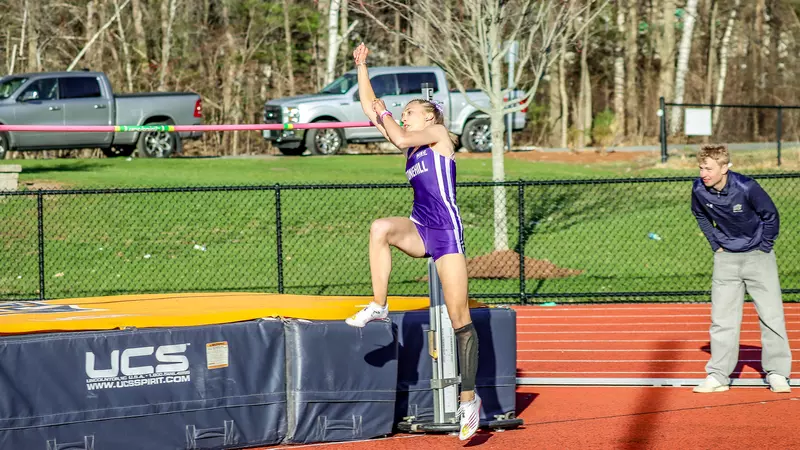
EASTON, Mass. (April 30, 2025) – Freshman Hannah Santos (Swansea, Mass.) of the Stonehill College track and field team was named Northeast Conference Rookie of the Week for the second time this year, the conference announced on Wednesday.
Santos and the Skyhawks competed at the University of Massachusetts this past weekend as the Minutemen hosted the Ken O’Brien Pre-Conference Meet at the UMass Track and Field Complex.
Santos won the high jump on Sunday, reaching a distance of 1.63m (5′ 4.25″), the second-best mark in the NEC and the second-best mark among freshmen in the conference. Just a week ago, Santos was named an NEC Prime Performer after winning the high jump with the same mark of 1.63m at Merrimack. The Swansea, Mass. native ranks fourth all-time in Stonehill program history in the outdoor high jump with her personal record of 1.63m.
Santos has now tallied four Prime Performer honors, two in the outdoor season and two during the indoor season, while earning her second Rookie of the Week award after earning one during the winter.
Also earning NEC weekly honors were graduate student Kaytlin Encarnacao (Reading, Mass.) and junior Jordan Malloy (Colchester, Conn.), who were both tabbed as Prime Performers for their performances at UMass last weekend.
Encarnacao finished runner-up in the 400-meter dash, recording the second-fastest time of her career in the event, finishing in 55.35 seconds. This marks the top time in the NEC this spring. This also marks a Stonehill women’s outdoor track and field record. Encarnacao also placed sixth in the 200-meter dash, finishing in 25.18 seconds, the ninth-best time in the conference.
Malloy earned her first Prime Performer nod of the outdoor season after a fifth-place finish in the 1500-meter run as she set a new personal record at 4:30.73, the third-fastest time in the NEC this spring.
On the men’s side, graduate student Jacob Pacheco (Merrimack, N.H.) earned his first Prime Performer nod of the season. He had the second-best javelin throw in Stonehill’s program history, reaching a new PR of 59.78m (196′ 2″) while improving on his second-place ranking in the NEC in the event. He won the javelin throw at UMass and Merrimack in back-to-back meets.
Stonehill Track and Field hosts this weekend’s two-day Northeast Conference Outdoor Championships at W.B. Mason Stadium beginning on Saturday, May 3.
For the latest on Stonehill Athletics, follow the Skyhawks via social media on Twitter, Facebook, and Instagram.
Sports
Jackson and Nate Arnold help push each other, Gulf Breeze boys volleyball
Nate Arnold was already playing beach volleyball a bit, and was part of the C2 Attack Volleyball Club in Tennessee. He and a couple friends, including Spencer Smith – also a beach player – went to a Choctaw boys volleyball practice and had one simple thought. “Why can’t we do this in Santa Rosa County?” […]
Nate Arnold was already playing beach volleyball a bit, and was part of the C2 Attack Volleyball Club in Tennessee.
He and a couple friends, including Spencer Smith – also a beach player – went to a Choctaw boys volleyball practice and had one simple thought.
“Why can’t we do this in Santa Rosa County?” they asked.
A group of parents in the Gulf Breeze area gauged interest in creating an area high school boys volleyball team. There was already a handful of beach and indoor players involved in different programs throughout the southeast, and Gulf Breeze High would be the host school.
The Dolphins had players from Gulf Breeze, obviously, while gaining others from Navarre and Central – like Arnold.
When the team was announced, Nate’s older brother, Jackson Arnold – a Central alum and a standout volleyball player who played collegiately at Webber International University – initially said he’d come and watch the team play.
After a few weeks without anyone willing to step in and build a program from the ground up, Jackson was approached to be the head coach.
“I started thinking about it and thought this would be a great way for me to give back to the game that gave me everything,” Jackson said. “I decided to do it, and I’ve enjoyed it ever since.”
That’s not to say there wasn’t any hesitation. Arnold, in his early 20s, still tries to play as much volleyball as he can. While there are times he wishes he could play the game he loves a little bit more, coaching that same game has its own rewards.
“I still get that same competitive rush and that same family feeling of being part of a team,” Jackson said. “It did help that Nate was part of the team. … I know that I have someone to tell me, ‘Hey, we didn’t like what happened at practice or this drill, and this is why.’ It’s a good feedback loop where there’s no feelings hurt and it all comes from a positive place. It’s never an attack or a negative outcome. It’s always a good amount of feedback that filters through.”
The Dolphins joined the FHSAA ranks in 2024, making it to the region tournament in their inaugural campaign. On April 30, Gulf Breeze claimed its first district championship, earning an automatic bid into the region tournament this time around.
And the rest, as they say, is history.
“Hopefully we can extend the season as much as possible. I’m just trying to take it all day by day, enjoying the process of what I was thinking on Day 1 here to what I’m thinking now with the team I have,” Jackson said. “We’ve had growth as a team, building the culture and community.”
A family within the family
When Gulf Breeze first got to practicing, building the culture and a team family was one of the top priorities for Jackson.
It helped that the not-blood-related family of the growing team was bolstered by blood-related brothers − brothers who had already played high levels of volleyball in Tennessee at C2 and around different parts of the country in both indoor and beach.
Jackson Arnold had played for about a year-and-a-half before Nate got the volleyball bug. They joined C2 at the same time, though were part of different age-group teams.
“We have our own experiences, being in different age groups. His age group was a little better suited nationally than mine was in his first year,” Jackson said. “Volleyball’s one of those sports where you learn a lot by traveling with your teammates and your family. It’s one of the coolest aspects of the sport.”
“It was cool to see more guys play volleyball,” said Nate, who noted that boys volleyball is more popular throughout the Midwest.
But a few years of traveling definitely took its toll. That’s when the opportunity for the Gulf Breeze varsity team took shape.
“Playing locally is a lot more fun and a lot easier on me, instead of having to travel every weekend,” Nate said.
All they had to do was get enough players to field a roster, while building the foundation. Thanks to the different personalities of the Arnold brothers – Jackson is more of a “vocal and communicative” leader while Nate talks on the “showing” leader – they made it work.
“He’s a different leader than what I am, which is a good mix,” Jackson said. “It’s a good cop-bad cop situation. … (Nate’s) going to do it himself and show it he’s able to do it, rather than telling people how to do it. Younger players will start picking up on his good habits and replicate those.”
“I thought we’d be teaching a lot of guys to play volleyball. I was fine with that,” Nate said. “But I’ve been pleasantly surprised that we have a lot of volleyball players instead of just athletes in Year 1 and Year 2.”
‘A really good understanding of responsibilities’
Having your older brother as your coach doesn’t come without its struggles. Even if they are light-hearted at times.
“I get questions all the time, ‘What’s Jackson doing at practice?’” Nate said with a laugh. “I tell them, ‘I don’t know, he doesn’t tell me anything. I know as much as you do.’”
Teaming up has also allowed the Arnold brothers’ relationship to grow even more. After practices and games, Jackson and Nate can “deep-dive” into what went right or wrong, and why it happened.
Opportunities also present themselves for Nate to be a “buffer” or the middle man between the coach and other players.
“Sometimes players don’t want to tell their coaches what’s going on. Sometimes they’d rather just tough it out. Nate is good about being able to explain situations,” Jackson said. “Or, if other players don’t understand something I’m saying, Nate can put it in better terms so they understand it.”
Being at practice or in games together allows the duo to see each other grow in different aspects of life and in their own volleyball journeys.
Nate noted Jackson’s maturity, taking on the responsibility of leading a high-level high school team, and, in some instances, being just a few years older than the players he’s coaching.
“From a coaching perspective, I think that’s helped Jackson develop even more as a player,” Nate said.
Jackson’s noticed even more of a boost in Nate’s volleyball IQ and assessment of the game from both an analytical and “feeling” side of the game.
“You’ve got to be able to identify who’s in a good rhythm and who’s not. I’ve definitely seen Nate grow in his decision-making, based upon those factors,” Jackson said. “As a teammate with emotional intelligence, he’s grown. He’s found ways to pick up his teammates.”
But, at the end of the day, they’re still brothers. Now, they’re just working together on a common goal for the Dolphins.
“I just have to forget he’s my brother whenever we’re at practice or at games. It’s Coach Jackson, not my brother Jackson,” Nate said.
“If you have a sibling, you know how it is. Everything’s always competitive. But whenever he’s on the court and I’m coaching, we have a really good understanding of responsibilities and boundaries. My responsibility is to provide this team with the best opportunity, and Nate’s responsibility is to execute the gameplan on the court,” Jackson said. “Yes, I am his coach. And yes, we are brothers. But he understands that I’m doing him an injustice if I don’t push him as hard – if not harder – than his teammates. Our team will not be as strong as if he is not pushed to his limit, as well.”
-

 College Sports2 weeks ago
College Sports2 weeks agoFormer South Carolina center Nick Pringle commits to Arkansas basketball, John Calipari
-
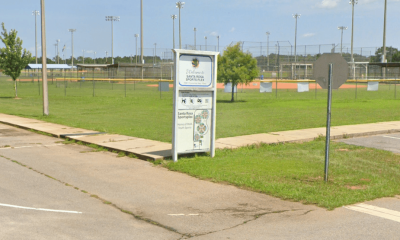
 Rec Sports7 days ago
Rec Sports7 days agoDeputies investigating incident that caused panic at Pace youth sports complex
-
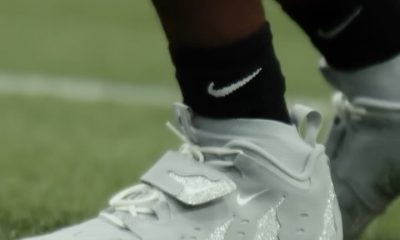
 Fashion7 days ago
Fashion7 days agoThis is poetry in motion.
-
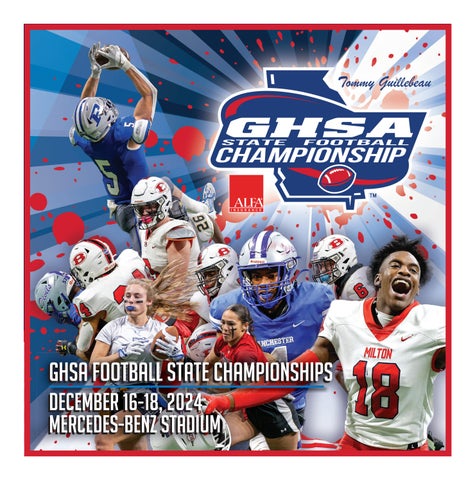
 High School Sports1 week ago
High School Sports1 week agoAppling County football to forfeit all 10 wins from 2024
-
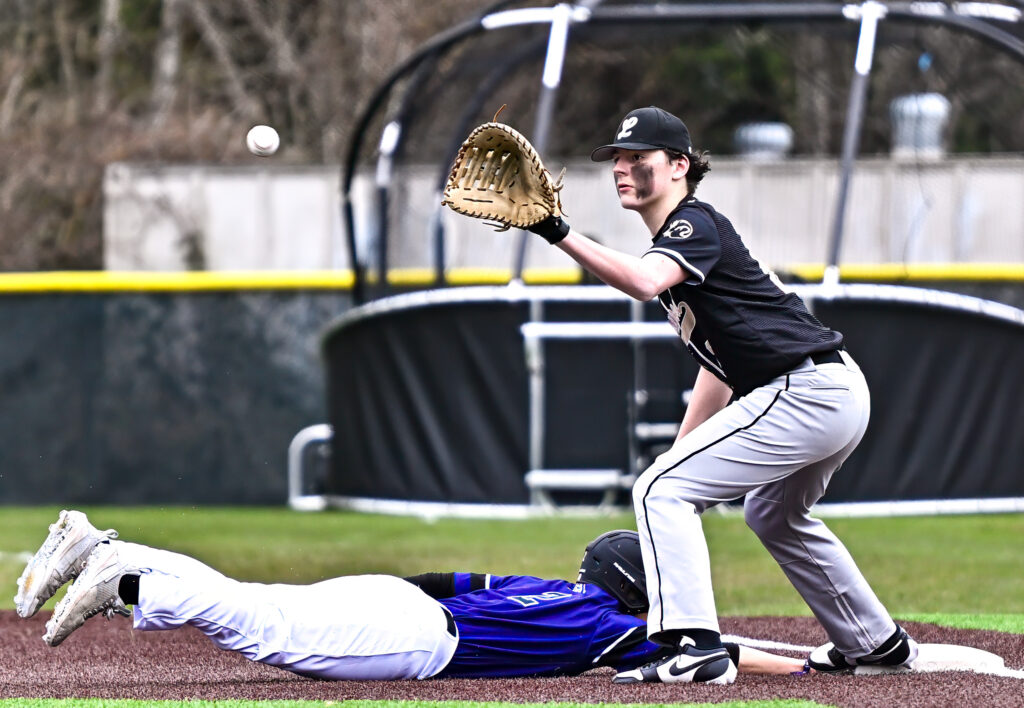
 Sports2 weeks ago
Sports2 weeks agoSports Roundup
-
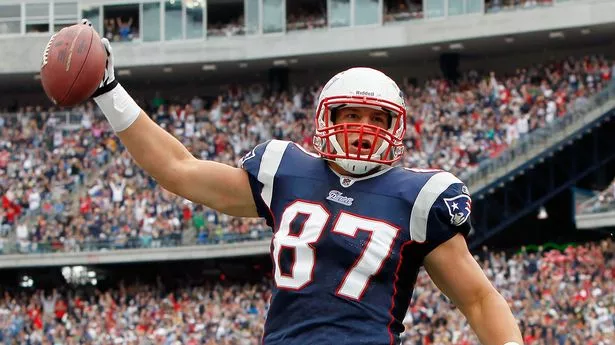
 NIL2 weeks ago
NIL2 weeks agoPatriots Legend Rob Gronkowski Makes Surprising Career Move
-
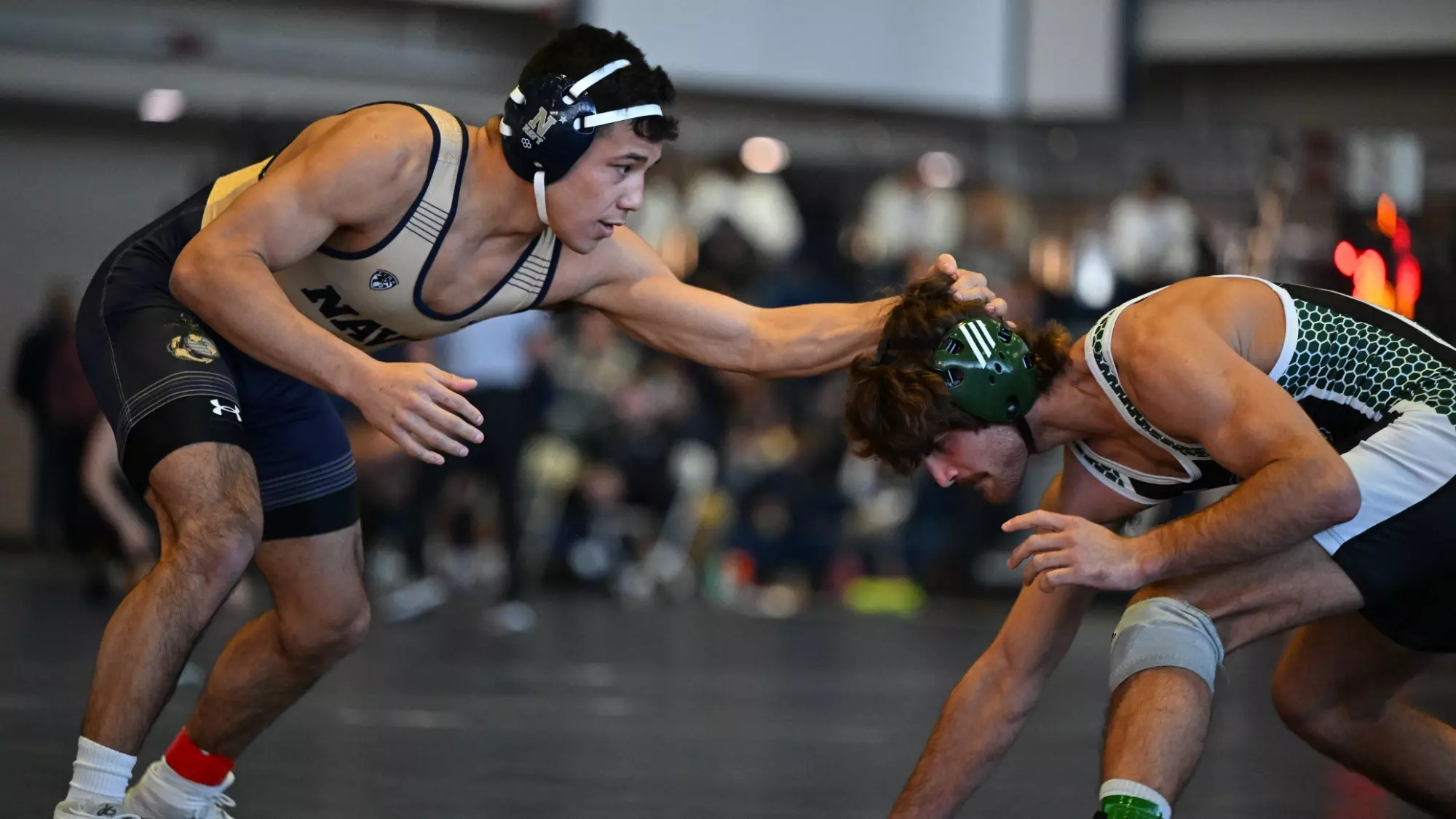
 College Sports1 week ago
College Sports1 week agoLehigh wrestlers prepare for wrestling U.S. Open
-
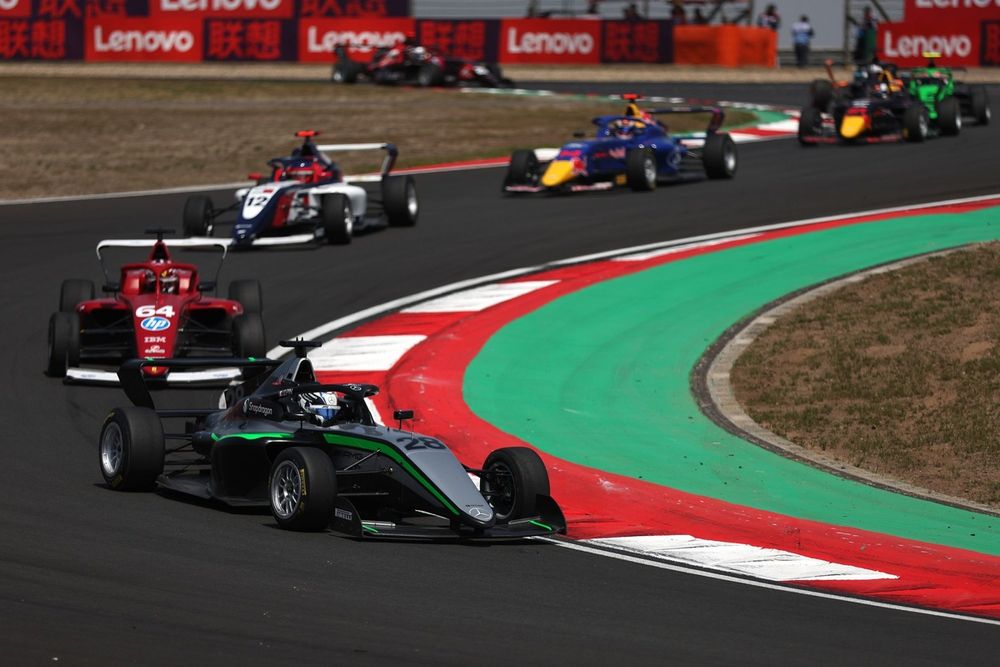
 Fashion2 weeks ago
Fashion2 weeks agoWatch Saudi Arabian GP free live stream
-
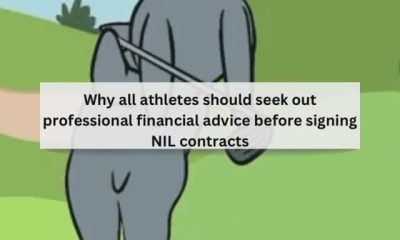
 NIL7 days ago
NIL7 days agoSave Like a Pro: NIL money isn’t free cash—taxes take a bite! Set aside part of …
-

 Sports1 week ago
Sports1 week agoHow to watch Yahoo Sports' NFL Draft Live show

